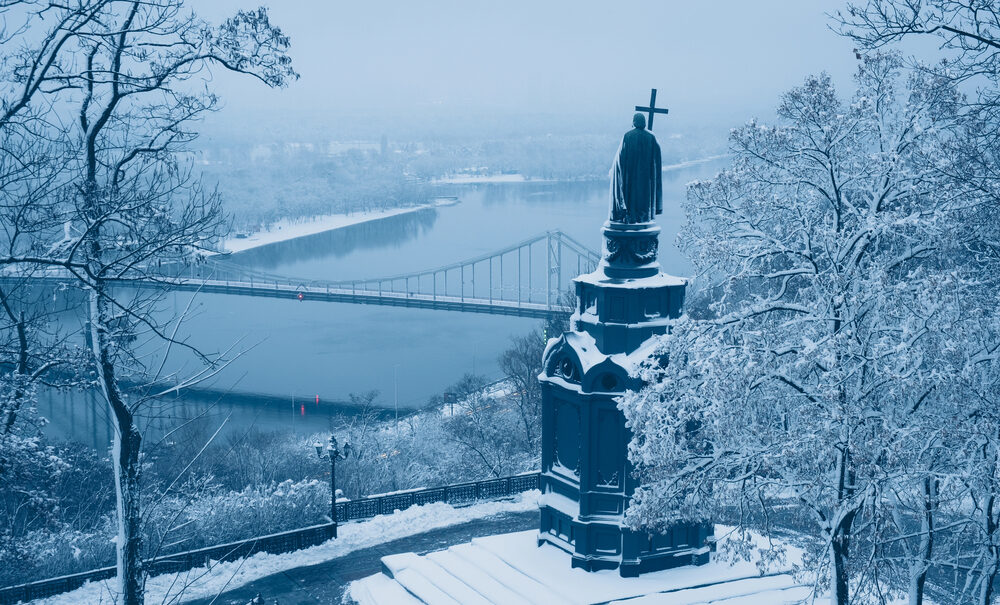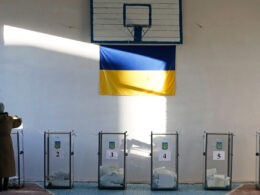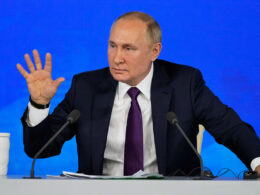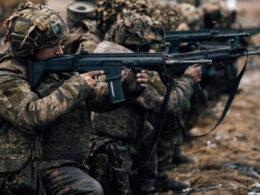As Ukraine concludes its third year of full-scale war with Russia, public opinion is shifting. Recent surveys indicate that, for the first time since the invasion began, most Ukrainians now favor negotiations to end the war over continuing to fight until victory. This change comes amid escalating Russian offensives and rapid territorial gains, insufficient Western military aid, and the profound strain of prolonged warfare on Ukrainian society.
With US President-elect Trump promising a swift resolution to the war, though the specifics of his approach remain unclear, and peace talks increasingly discussed both in Ukraine and abroad, understanding what Ukrainians really think—and why these views are changing—becomes crucial for any potential negotiations ahead.
Data shows the shift but nuances matter
Gallup's latest polling data from late 2024 reveals a dramatic shift in Ukrainian public sentiment. While 73% of Ukrainians preferred fighting until victory in early 2022, and 63% maintained this stance in 2023, by late 2024, the numbers had reversed:52% now favor pursuing negotiations to end the war, while 38% advocate continuing the fight until victory.
However, this shift demands careful interpretation, as the term "negotiations" encompasses multiple strategic approaches, each carrying distinct implications for Ukraine's future. The willingness to "negotiate" does not necessarily indicate readiness for compromise on fundamental issues.
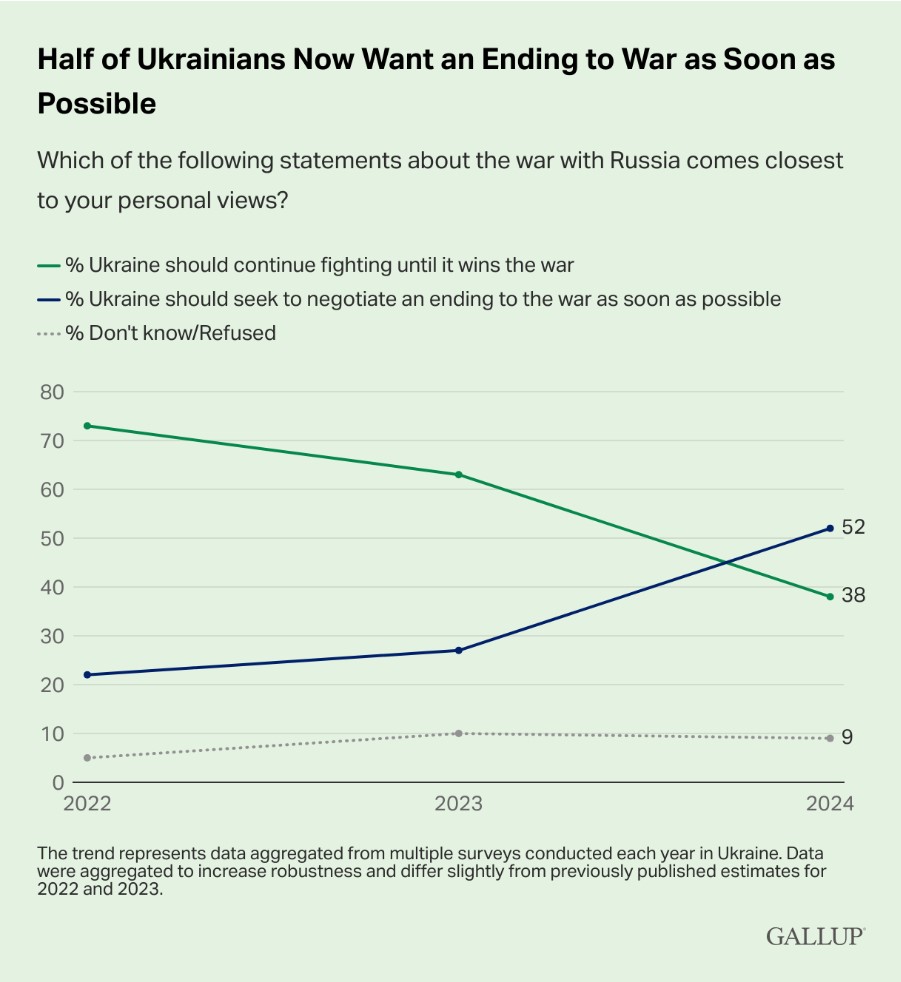
The New Europe Center's December 2024 survey reveals that this apparent openness to negotiation exists within strict parameters. An overwhelming 74.5% of Ukrainians oppose any reduction in military capabilities (a figure that has remained largely unchanged since 2022), 70.9% reject granting the Russian language official status, while 68.4% firmly reject any suggestion of waiving criminal prosecution of Russian leaders and war criminals. These findings suggest that strategic red lines remain firmly drawn while tactical flexibility increases.
Ukrainians know their army lacks weapons and other resources, which may explain the tactical flexibility reflected in shifting views captured by polls. Battery commander Mykhailo Temper told The Financial Times in an October 2024 interview, “Right now, I’m thinking more about how to save my people. It’s quite hard to imagine we can move the enemy back to the borders of 1991.”
A summer 2024 survey conducted by the Kyiv International Institute of Sociology revealed that 77% of participants had lost family members, friends, or acquaintances, which showcases the increasing impact of the war toll.
Gallup's finding that 52% of negotiation supporters would consider territorial concessions requires careful contextualisation. This view exists within a framework where the definition of "victory" among fighting supporters has not significantly shifted (from 92-93% requiring full territorial restoration in 2022-2023 to 81% in 2024).
The Rating Group's parallel survey from September-October 2024 provides additional context, showing that 88% of Ukrainians still believe in ultimate victory, though this represents a 9-10% decrease from April 2022 levels. Combined with Gallup's findings, this data suggests that the shift reflects a pragmatic response to battlefield realities rather than a fundamental change in national aspirations.
Ukraine’s war-torn regions are also the most exhausted
Support for fighting until victory has plummeted across Ukraine, with the sharpest drops in areas directly affected by combat. According to Gallup's findings, in the eastern regions, which have endured the brunt of Russian attacks, support has fallen from 60% in 2022 to less than 30% in late 2024.
The decline appears in safer regions, too. In western Ukraine, where daily life remains relatively undisturbed by direct combat, support for fighting until victory has dropped from 80% to 40%.
These numbers show how three years of war have affected the whole country. While eastern Ukraine felt the war's impact first through bombs and battles, the toll of a long war – from ammunition shortages to personal losses – has spread everywhere. Yet despite growing war fatigue, Ukrainians across all regions still oppose giving up core national interests.
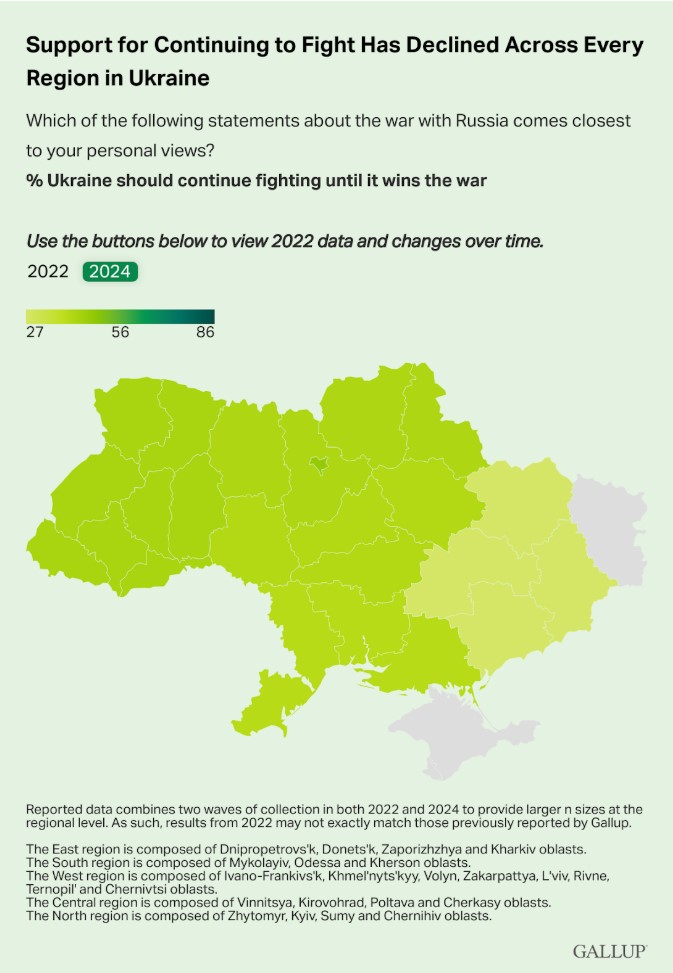
Rapid shifts in polls reflect changing war realities
Earlier polling from March 2024 adds another layer to this complex picture. When the Rating Group asked about preferred strategies, only 26% chose "Seek a compromise through negotiations," while 51% supported fighting until full territorial liberation. Yet when asked directly about negotiations, 43% supported peace talks while 54% opposed them – numbers closer to Gallup's November findings.
Ukrainians also show deep skepticism about Russia's intentions. 55% believe Russia would reject Ukraine's terms entirely, while 38% think a partial agreement might be possible. More tellingly, almost 70% expect Russia to attack again even after any peace treaty.
One of the most intriguing findings comes from the New Europe Center's research regarding security guarantees. Ukrainians are almost equally divided between two seemingly contradictory approaches:
- 31.3% favor developing nuclear weapons for strategic autonomy
- 29.3% support gradual NATO accession, suggesting faith in collective security arrangements.
This even split suggests Ukrainians trust neither complete self-reliance nor total dependence on allies for their future security. This article explains this development more.
Looking ahead, the Rating Group's March survey found most Ukrainians believe the war will last 1-2 years (36%) or less than a year (23%). However, these timeframes haven't been tested in more recent polls.
Ukrainians trust Europeans over Americans
Even as peace talks become more discussed, Ukrainians clearly prefer who should mediate them. Gallup's survey shows strong support for European leadership: 70% want the European Union to play a significant role, and 63% favor UK involvement.
The United States, despite its military support, appears less trusted as a mediator. Only about half of peace-talk supporters see America as an essential negotiator. This view held steady whether respondents were asked about President Trump or Vice President Harris (this poll was conducted before the US election results became known).
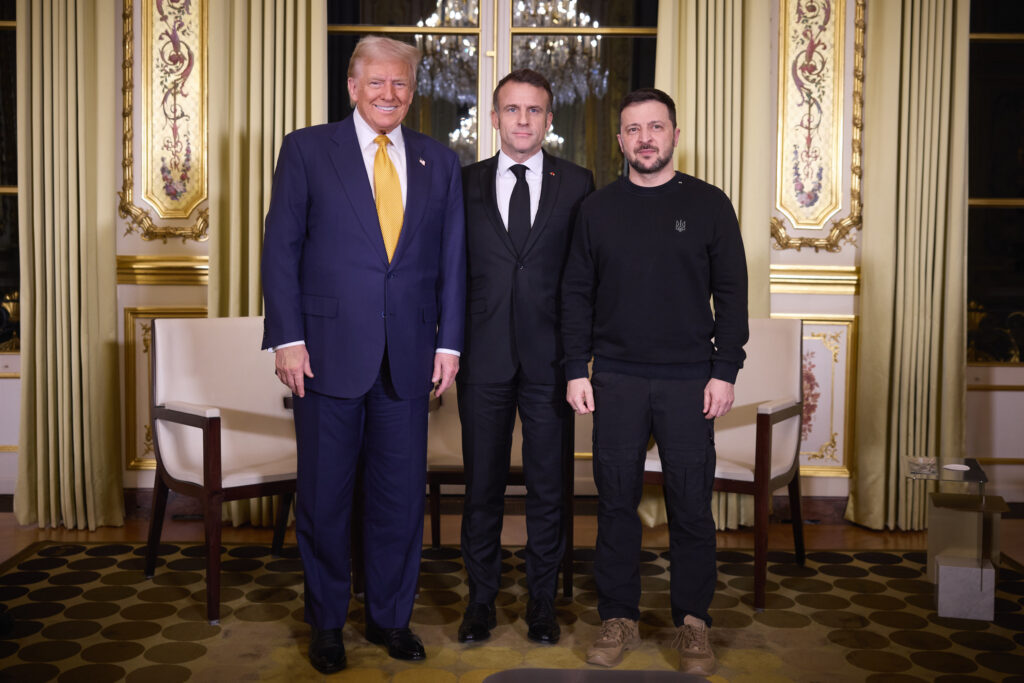
A nation adapting, not surrendering
These findings reveal how Ukrainian society is evolving its approach to the war. While core principles remain firm – sovereignty, identity, and national interests are non-negotiable – tactics are becoming more flexible. Ukrainians increasingly recognize that achieving their goals might require different paths than initially imagined.
This isn't a simple shift from fighting to negotiating. Instead, it shows a more sophisticated understanding of how to secure Ukraine's future. The public increasingly distinguishes between what must be preserved and what can be adjusted – a critical difference as peace talks potentially approach.
Read more:
- Ukrainians are now most Trump-positive nation in Europe, poll shows
- Scholz, Trump agree to seek peace in Ukraine in phone call
- Zelenskyy plans to discuss US aid with Trump after inauguration, emphasizes importance of US-EU unity
- Zelenskyy confirms Trump advisor Keith Kellogg to visit Ukraine in early January

